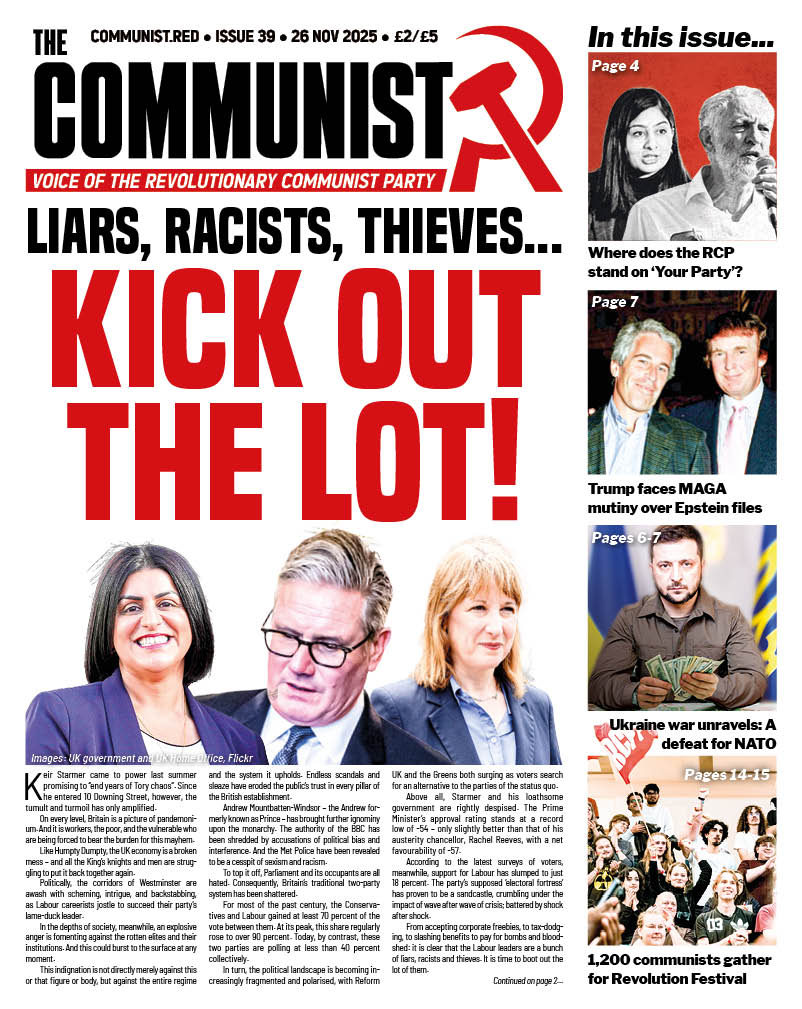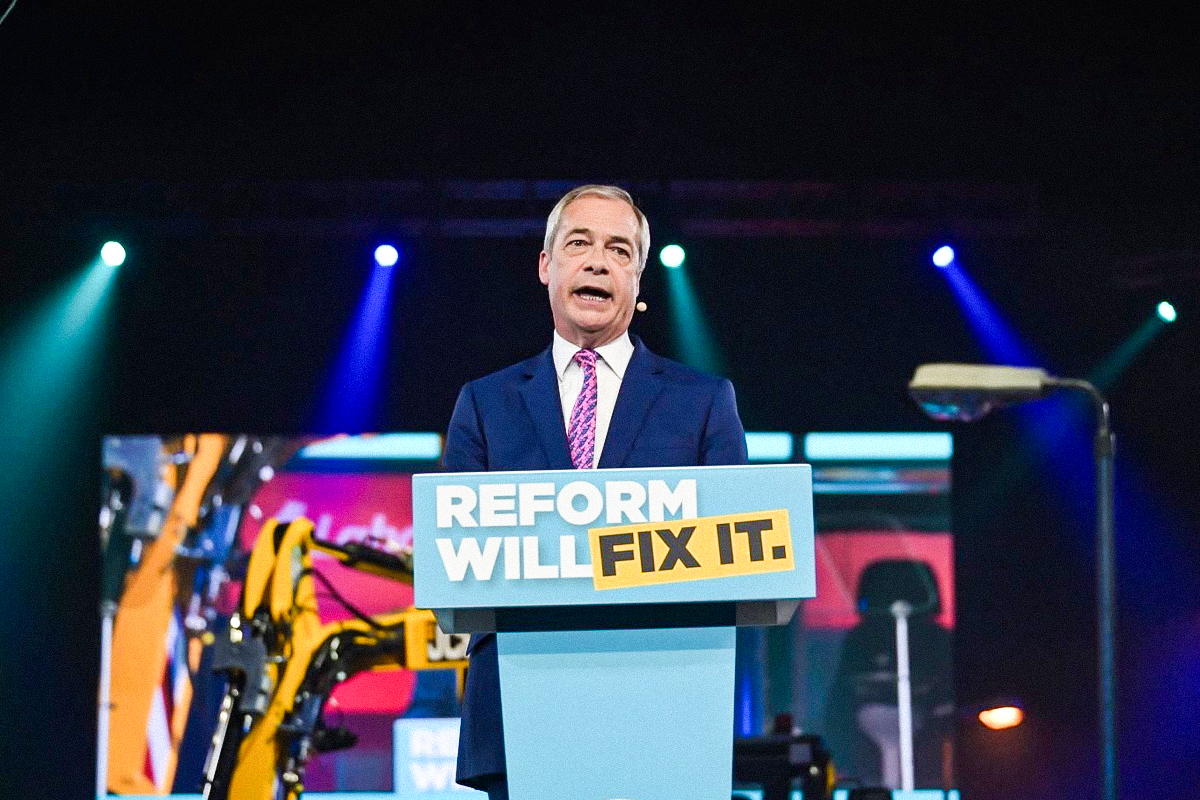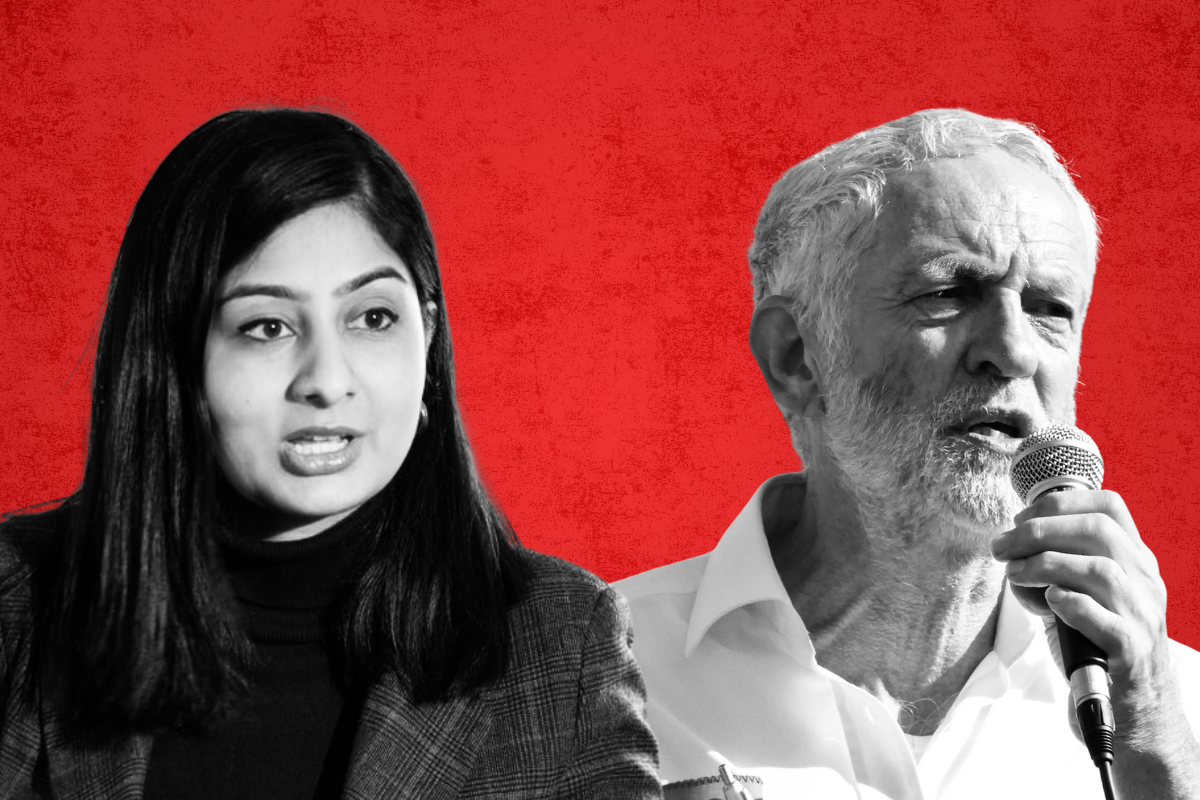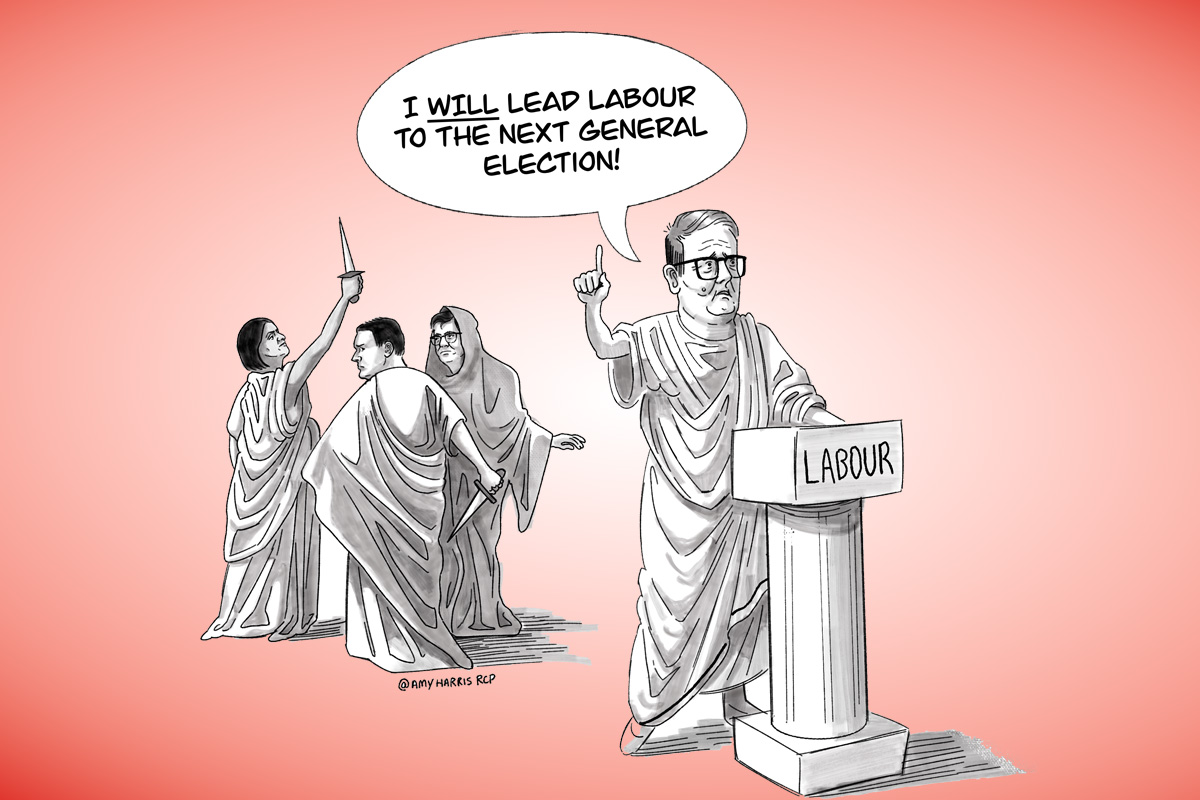Keir Starmer came to power last summer promising to “end years of Tory chaos”. Since he entered 10 Downing Street, however, the tumult and turmoil has only amplified.
On every level, Britain is a picture of pandemonium. And it is workers, the poor, and the vulnerable who are being forced to bear the burden for this mayhem.
Like Humpty Dumpty, the UK economy is a broken mess – and yesterday’s Budget showed that all the King’s knights and men are struggling to put it back together again.
Politically, the corridors of Westminster are awash with scheming, intrigue, and backstabbing, like a second-rate episode of Wolf Hall, as Labour careerists jostle to succeed their party’s lame-duck leader.
In the depths of society, meanwhile, an explosive anger is fomenting against the rotten elites and their institutions. And this could burst to the surface at any moment.
Crisis of the regime
This indignation is not directly merely against this or that figure or body, but against the entire regime and the system it upholds.
Endless scandals and sleaze have eroded the public’s trust in every pillar of the British establishment.
Andrew Mountbatten-Windsor – the Andrew formerly known as Prince – has brought further ignominy upon the monarchy. The authority of the BBC has been shredded by accusations of political bias and interference, whilst the Beeb’s board is riven with splits. And the Met Police have been revealed, once again, to be a cesspit of sexism and racism.
To top it off, Parliament and its occupants are all hated. Consequently, Britain’s traditional two-party system has been shattered.
For most of the past century, the Conservatives and Labour gained at least 70 percent of the vote between them. At its peak, this share regularly rose to over 90 percent. Today, by contrast, these two parties are polling at less than 40 percent collectively.
In turn, the political landscape is becoming increasingly fragmented and polarised, with Reform UK and the Greens both surging as voters search for an alternative to the parties of the status quo.
Crooks, liars, and warmongers
Above all, Starmer and his loathsome government are rightly despised.
The Prime Minister’s approval rating stands at a record-low of -54 – only slightly better than that of his wooden chancellor, Rachel Reeves, with a net-favourability of -57.

According to the latest surveys of voters, meanwhile, support for Labour has slumped to just 18 percent.
The party’s supposed ‘electoral fortress’ has been shown to be a sandcastle, crumbling under the impact of wave after wave of crisis; battered by shock after shock.
From accepting corporate freebies, to tax-dodging, to slashing benefits to pay for bombs and bloodshed: it is clear that the Labour leaders are a bunch of crooks, liars, and warmongers.
It is time to give the lot of them the boot.
Bankers’ demands
This all forms the hectic, unstable backdrop to the government’s latest Autumn Budget, outlined by Rachel Reeves in the House of Commons yesterday.
The Chancellor set out to appease both anxious capitalists and disenchanted voters. In the end, however, it is clear neither camp will be fully satisfied by Reeves’ patchwork of proposals.
On the one side, in the run-up to the Budget, Britain’s creditors – the well-heeled investors who own the UK’s debt bonds – were demanding austerity and attacks.

In interviews with the Financial Times, representatives of the world’s biggest asset management firms made it clear what they and their mega-rich clients wanted from the Chancellor: ‘fiscal consolidation, tightening, and discipline’; ‘deflationary measures’; and ‘balanced books’.
In plain speak, this means cuts to welfare, public services, and other social spending, alongside tax rises for ordinary families, in order to eliminate the ‘black hole’ in the public finances
Furthermore, CEOs and corporate lobbyists were calling on the government to avoid any steps – like extra costs or regulations on big business – that might heighten uncertainty, dampen investment, and thereby ‘hurt growth’ (i.e. curb their profits).
To save money, these ladies and gentlemen demanded that the ‘triple lock’ on pensions be broken. But what about the apparent lock on profits, which ensures that the billionaires always get richer, no matter what?
Similarly, they wanted ‘reform’ of the tax system. But this is just a euphemism for working people footing the bill for a crisis of the capitalists’ making.
And if the bankers and bosses didn’t get their way, they warned that all hell could break loose on the financial markets, sending the British economy into a debt-death spiral.
Clash of the classes
On the other side, Starmer and Reeves have found themselves under pressure from below: from their own backbenchers, who in turn are feeling the heat from their constituents, and are worried about losing their jobs come the next election.
The parliamentary rebellion seen this summer – in response to proposals for £5 billion in welfare cuts, to pay for an equivalent increase in military spending – was an alarm bell for the Labour leaders and wealthy bond holders alike.

If the government couldn’t push through these draconian measures, how could it expect to implement the brutal austerity agenda required to ‘fix the foundations’ of British capitalism, ‘get the UK economy growing’, and ensure that the billionaires get their pound of flesh?
Since this revolt, further rumblings at the top of the Labour Party have only added to the jitters on the markets.
Allies of the paranoid PM have even themselves invoked the spectre of the speculators in response to rumours – real and fabricated – of a leadership challenge, warning that such a move could spark a bond selloff and financial panic.
According to City AM, a mouthpiece of the big bankers: “Starmer’s team told journalists that investors would lose confidence in the Labour government if a leadership contest took place as investors trusted Reeves and Starmer.”
In short, there is a head on clash between the diktats of capital and the desires of ordinary voters. And this hapless Labour government finds itself caught in the middle; ground between the two great millstones in society: the capitalists and the working class.
Sinking ship
This explains the contents of the Chancellor’s Budget: a precarious balancing act between the demands of the markets and of restless Labour MPs; a Goldilocks ‘smorgasbord’ of tax rises, designed to reduce the deficit whilst providing enough sops – like the abolition of the two-child benefit cap – to keep mutinous backbenchers at bay.
For now, both camps seem to have been subdued. In the long-run, however, Reeves’ Budget will please no-one. The Treasury’s plans will be both too much for workers to accept, yet too little for what the capitalists require.

Whilst the capitalist press lambasts Labour for being too ‘left-wing’, the reality is that there is little in the government’s Budget for workers to celebrate.
The main announcement – a freeze in income tax thresholds – will stealthily lead to less take-home pay for millions of wage earners. Combined with persistent inflation, this means that real living standards are forecast to grow at just 0.5 percent a year on average over the course of this Parliament: the second-worst performance since records began in the 1950s.
All the while, most government departments continue to face a spending squeeze, with public services and local councils running on shoestring, threadbare budgets.
On the other hand, the strategists of British capitalism are also disappointed with Starmer and Reeves; frustrated that they did not use this year’s Budget as an opportunity to carry out the sweeping ‘reforms’ – i.e. cuts and deregulation – mentioned above.
According to the editorial board of the Financial Times, a more sober mouthpiece of the bankers and big investors, this was “a stop-gap Budget that will surprise few and inspire economic optimism in even fewer”.
“The best that can be said for this Budget,” comments the FT elsewhere, “is that it could have been worse.”
Similarly, liberal journal The Economist described Reeves’ tax-and-spend statement as a “bodge job” that “will do nothing to arrest Britain’s managed decline”.
These capitalist outlets may be cold and callous, looking out for the class interests of the bosses and billionaires, but they are right. British capitalism is a sinking ship, and Labour’s latest Budget does nothing to plug the gaping holes in its hull.
Instead, Britain’s economic position is set to go from bad to worse, with the country increasingly squeezed out of the world market by the big imperialist powers; bounced from pillar to post by the instability and turbulence of capitalism in crisis.
Starmer’s death agony
In turn, the death agony of Starmer’s government will be prolonged.
Threats of an immediate leadership challenge may have been quelled. But the knives are still out for Starmer, with opportunists like Wes Streeting, Shabana Mahmood, and Andy Burnham all no doubt continuing their manoeuvring behind the scenes.

Above all, it is clear that Labour is heading for a bruising defeat at the elections next May, which will see contests for the Scottish and Welsh devolved parliaments, as well as in local councils across the country.
Opposition parties like Reform and the Greens – along with the SNP and Plaid in Scotland and Wales, respectively – are likely to make big gains, while Labour are set to lose a swathe of seats.
This could prove to be the final straw for Labour MPs, leading to moves to replace Starmer and Reeves – and opening up a veritable Pandora’s Box in British politics.
The problem for the ruling class is that they do not have any reliable replacements for the current occupants of Downing Street.
‘Sir’ Kid Starver may be useless and impotent – detested by voters, unliked by his own MPs, and unable to carry out the policies that the capitalist establishment needs. But at least he is one of them.
This crisis of leadership for the British bourgeoisie is a reflection of the crisis of British capitalism.
Leon Trotsky once noted how the capitalist class in Britain used to have far-sighted representatives, capable of “thinking in terms of centuries and continents”.
Today, by contrast, The Economist mourns that “there is no grand plan for this government, which…is incapable of thinking even weeks ahead, never mind years”.
Such is the degeneration of British capitalism and its political agents.
‘Responsible’ Reform
Waiting in the wings, meanwhile, is Nigel Farage.
In a bid to curry favour with big business and investors, the Reform UK leader has changed his tune of late, pledging – like Starmer and Reeves – to also be ‘responsible’ with the country’s finances.

“We are being mature, we are being sensible, and we are not over-promising,” he recently reassured a City of London audience.
Nevertheless, behind Farage stands a motley crew of supporters who have other ideas; a fragile coalition that is united by Reform’s demagogic denunciations of the establishment and promises to fix ‘broken Britain’.
Like Meloni in Italy or Le Pen in France, then, Farage may also seek to become a more ‘respectable’ capitalist politician. But with his populist background and backing, the ruling class will never fully trust him.
So they are stuck with Starmer, for now, as the least bad option.
Radical potential
At the same time, Labour is haemorrhaging support to its left, with Zack Polanski and the Greens gaining at the expense of both Starmer and the shambolic ‘Your Party’.
When Corbyn and Sultana announced their intention to launch a new left party back in July, the potential for this new political formation was enormous.

Hundreds of thousands signed up in support within days, showing the enthusiasm and excitement that existed about the prospect of a proper left alternative in British politics.
Yet thanks to the squabbles and bickering amongst the party’s leaders, all of this potential has been squandered, at least for now.
By contrast, Polanski has successfully tapped into the anti-establishment sentiments amongst workers and youth, resulting in tens of thousands of new members joining the Green Party.
This demonstrates the radicalisation that exists in society, seeking a political expression and outlet wherever it can.
Join the revolution
The Revolutionary Communist Party is also connecting with this mood – as evidenced by the success of our autumn recruitment drive on the country’s campuses, and by the incredible attendance and energy on display at this year’s Revolution Festival.
Importantly, however, we are channeling this dynamism into a genuine alternative and solution to the ills we face: not into attempts to patch-up this bankrupt system, but into a force that can overthrow it.
While Starmer and co. seek to prop-up capitalism, and the left reformists appeal for the capitalists to be ‘nicer’ and ‘kinder’, we are organising workers and youth in the fight for revolution.
There has never been a better time to join us in this struggle.






